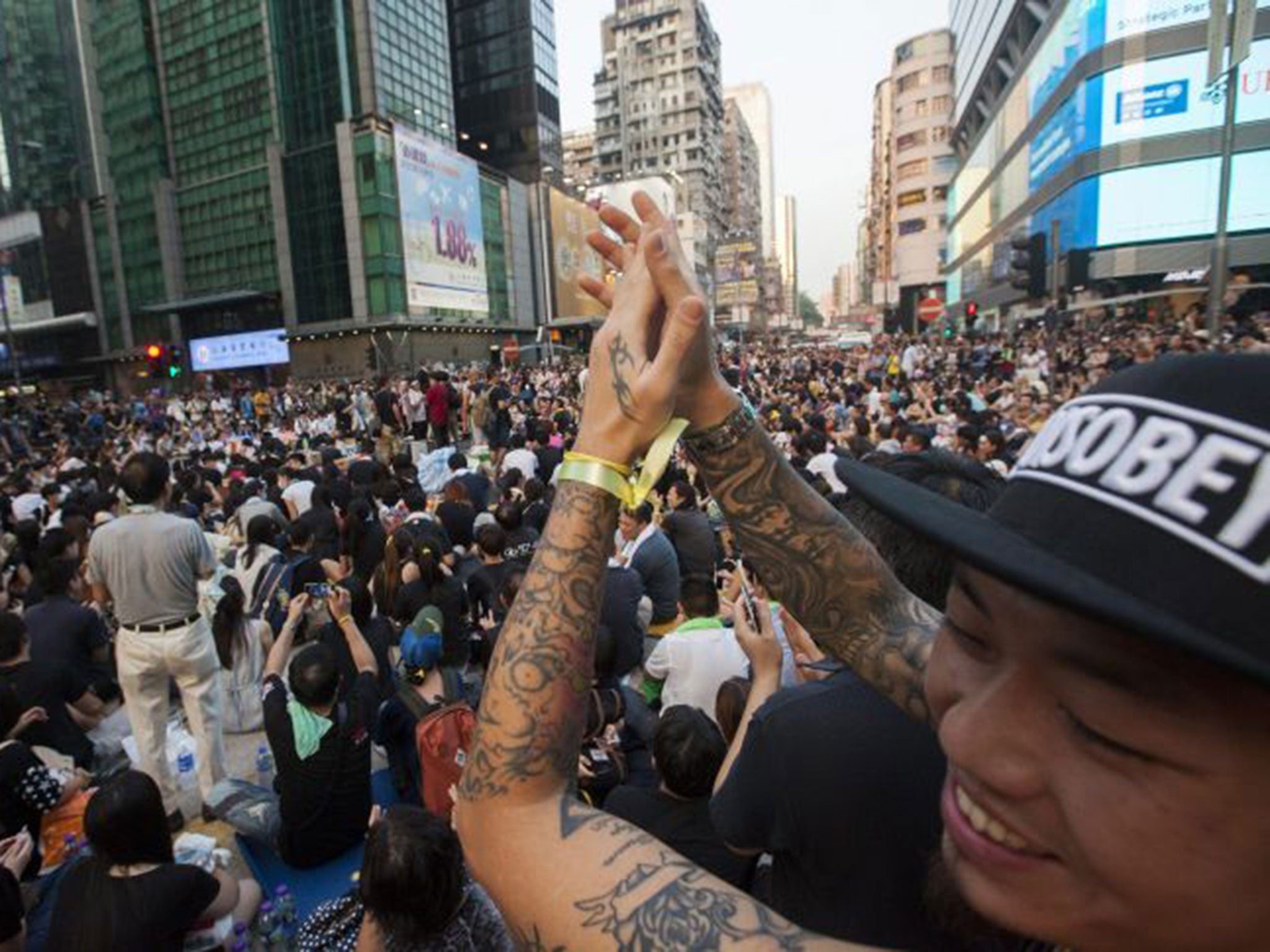Hong Kong protests: Quiet as Occupy Central demonstrations spread among abandoned police vans
A peaceful and buoyant crowd listened to speeches calling for the resignation of the city's leader, Chief Executive Leung Chun-Ying

Your support helps us to tell the story
From reproductive rights to climate change to Big Tech, The Independent is on the ground when the story is developing. Whether it's investigating the financials of Elon Musk's pro-Trump PAC or producing our latest documentary, 'The A Word', which shines a light on the American women fighting for reproductive rights, we know how important it is to parse out the facts from the messaging.
At such a critical moment in US history, we need reporters on the ground. Your donation allows us to keep sending journalists to speak to both sides of the story.
The Independent is trusted by Americans across the entire political spectrum. And unlike many other quality news outlets, we choose not to lock Americans out of our reporting and analysis with paywalls. We believe quality journalism should be available to everyone, paid for by those who can afford it.
Your support makes all the difference.Crowds blocked and occupied another major road in Hong Kong on Monday night, as the angry protest movement for greater democracy spread across the Chinese territory.
In the bustling shopping district of Mong Kok, up to ten thousand protesters donned yellow ribbons whilst blocking up roads, denouncing perceived police heavy-handedness and calling for the resignation of the city's leader, Chief Executive Leung Chun-Ying.
Abandoned police vans were the only remaining vestige of law enforcement, as the peaceful and buoyant crowd listened to speeches from the leaders of the Occupy Central movement, who had travelled from the main financial and administrative hub on Hong Kong Island to the Kowloon peninsula.
The scene was a far cry from the previous evening across the water when police repeatedly fired tear gas at protesters, who each time dispersed until the fog cleared and regrouped at the police lines late into the night.
Those disturbances marked the largest escalation in tensions between pro-democracy protesters and the civic administration since Beijing set out its plans for Hong Kong's chief executive election in 2017. The plan includes the first ever "one man one vote" arrangement for Hong Kong, but candidates will be limited to "two or three", all of whom will need more than 50 per cent approval from a broadly pro-Beijing election committee.
"We are so peaceful, we are only expressing what we feel. We are angry," said Chung Tak Chi, a 24-year-old HongKonger who works for an electrical company.
"The Chinese government are more and more taking over Hong Kong. They just ignore us. The police didn't used to throw bombs, didn't shoot us."
"It's Chinese style," interjected Snow Li, a 27-year-old social worker, before heading across the Victoria Harbour to join the occupation in Central.
Mr Chi continued: "They (the Chinese government) promised we had 50 years in which we wouldn't change, but now it's all change. Before, the police didn't hurt us, but now they just hit people. It's all gone crazy. But the people won't change."
Monday's gathering, of up to 10,000 people, was notable for its calm and co-operative feel. People passed around snacks and bottles of water, as well as masks to protest against potential use of tear gas. A group of young men even wheeled in a digital turntable and started a reggae-infused dance about 200m from the centre of proceedings.
Similar protests were reported in the Tsim Sha Tsui and Wan Chai areas.
Sarah Mo, a 20-year-old nursing student who was at her first ever protest, said: "It's peace and it's love everywhere. Where can you find this elsewhere in the the world?"
At the far end of the occupied zone a barricade had been made from metal bollards and plastic traffic markers. There, on the rusty back of an upturned road sign, a man used chalk to write in Chinese characters: "You are about to leave the civic square at Mong Kok. Back to the everyday life of CY Leung.
Join our commenting forum
Join thought-provoking conversations, follow other Independent readers and see their replies
Comments